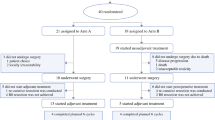Abstract
Background
Diarrhea is common with many types of chemotherapy and can have a major impact on maintaining dose intensity and treatment effectiveness, and on overall health care resource consumption. In this study, a cost of illness analysis was conducted to estimate the overall economic impact of grade III/IV diarrhea in patients with colorectal cancer receiving adjuvant or palliative chemotherapy.
Methods
This was a retrospective cohort study of patients with colorectal cancer who had received fluoropyrimidines, irinotecan or oxaliplatin (or a combination of these) and had developed grade III or IV diarrhea. Data collection included patient demographics, disease-related information and healthcare resource utilization to manage the grade III/IV diarrhea event (n=96).
Results
Grade III/IV diarrhea developed after the first cycle of chemotherapy in 54.2% of patients and was responsible for a median dose reduction and delay of 20% and 7 days, respectively. Overall, 31 of 96 patients (32.3%) required a hospital admission for supportive care with an 8-day median length of stay (range 2 to 28 days). When the economic impact of the grade III/IV diarrhea was quantified, the mean cost was Can $2559 per patient (95%CI: $1665 to 3453). A logistic regression analysis identified grade IV diarrhea (OR 11.2; P<0.001) and severe diarrhea developing after the first chemotherapy cycle (OR 3.1; P=0.051) as being significantly associated with patient hospitalization.
Conclusions
Grade III/IV diarrhea is a debilitating and costly complication of chemotherapy in colorectal cancer. Effective interventions that prevent the development of severe diarrhea need to be identified to save health-care costs and reduce patient morbidity.

Similar content being viewed by others
References
Arbuckle RB, Huber SL, Zacker C (2000) The consequences of diarrhea occurring during chemotherapy for colorectal cancer: a retrospective study. Oncologist 5:250–259
Cancer Therapy Evaluation Program, National Cancer Institute (1999) Common toxicity criteria, version 2.0. National Cancer Institute, Bethesda: National Institutes of Health, U.S. Department of Health and Human Services
de Gramont A, Seymour AF, Homerin M, et al (2000) Leucovorin and fluorouracil with or without oxaliplatin as first line treatment in advanced colorectal cancer. J Clin Oncol 18:2938–2947
Douillard JY, Cunningham D, Roth AD, et al (2000) Irinotecan combined with fluorouracil compared with fluorouracil alone as first-line treatment for metastatic colorectal cancer: a multicentre randomized trial. Lancet 355:1041–1047
Doyle C, Stockler M, Pintilli M, et al (1997) Resource implications of palliative chemotherapy for ovarian cancer. J Clin Oncol 15:1000–1007
Goldberg RM, Sargent DJ, Morton RF, et al (2004) A randomized controlled trial of fluorouracil plus leucovorin, irinotecan, and oxaliplatin combinations in patients with previously untreated metastatic colorectal cancer. J Clin Oncol 22:23–30
Grem JL, Shoemaker DD, Patrelli NJ, et al (1987) Severe life threatening toxicities observed using leucovorin with 5-fluorouracil. J Clin Oncol 5:1704–1712
Moertel CG, Fleming TR, Macdonald JS, et al (1995) Fluorouracil plus levamisole as effective adjuvant therapy after resection of stage III colon carcinoma: a final report. Ann Intern Med 122:321–326
Rosenoff S (2003) Octreotide LAR resolves severe chemotherapy-induced diarrhea (CID) and allows continuation of full-dose therapy. Proc Am Soc Clin Oncol 22 (abstract 3126)
Tournigand C, Andre T, Achille E, et al (2004) FOLFIRI followed by FOLFOX6 or the reverse sequence in advanced colorectal cancer: a randomized GERCOR study. J Clin Oncol 22:229–237
Wadler S, Benson AB 3rd, Engelking C, et al (1998) Recommended guidelines for the treatment of chemotherapy-induced diarrhea. J Clin Oncol 16:3169–3178
Zaniboni A (1997) Adjuvant chemotherapy in colorectal cancer with high-dose leucovorin and fluorouracil: impact on disease-free survival and overall survival. J Clin Oncol 15:2432–2441
Author information
Authors and Affiliations
Corresponding author
Additional information
Funding for this study was provided by an unrestricted research grant from Novartis Pharmaceuticals Canada Inc.
Rights and permissions
About this article
Cite this article
Dranitsaris, G., Maroun, J. & Shah, A. Severe chemotherapy-induced diarrhea in patients with colorectal cancer: a cost of illness analysis. Support Care Cancer 13, 318–324 (2005). https://doi.org/10.1007/s00520-004-0738-7
Received:
Accepted:
Published:
Issue Date:
DOI: https://doi.org/10.1007/s00520-004-0738-7




